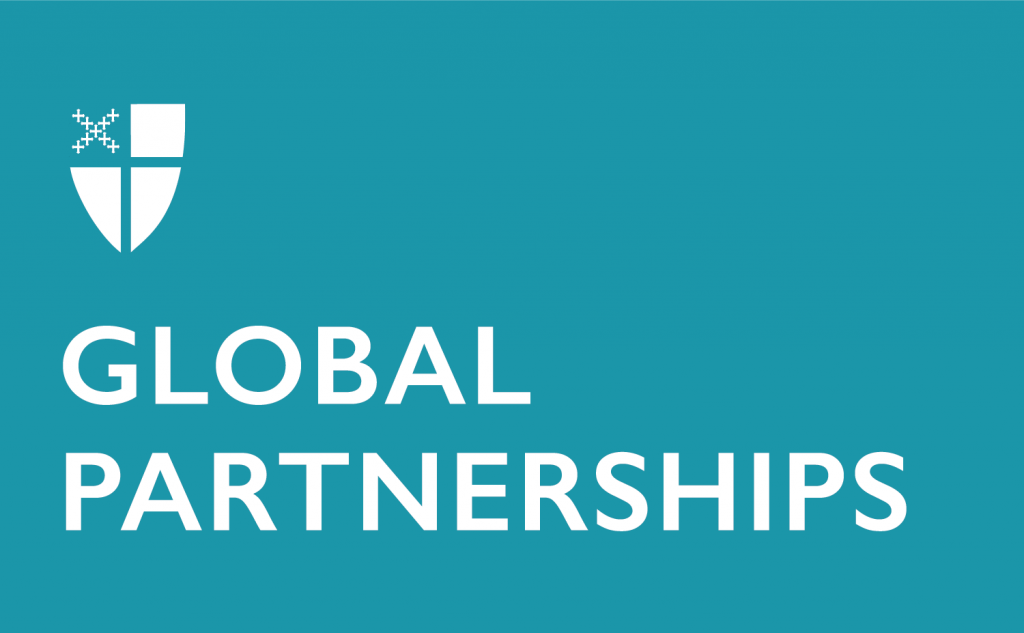The Episcopal Church and Ecumenical Women: Advocating at UNCSW to end violence against women and girls
The Anglican Communion delegation to UNCSW at the Chapel at the Church Center for the UN, March 2013
The Episcopal Church has long been active in raising consciousness about the prevalence of violence against women and girls, one of the most prevalent forms of gender violence. A global dimension of this activism is its annual engagement at the United Nations Commission on the Status of Women (UNCSW). Since 1946, member states of the United Nations have convened annually or biannually at UNCSW to promote women’s political, economic, civil, social and educational empowerment, and to make recommendations on urgent problems regarding women’s rights.
UNCSW reached a turning point in 1995 with the adoption of the Beijing Declaration and Platform for Action, a global policy framework for gender equality and the empowerment of women. Beijing set out 12 critical areas of concern, one of which is violence against women. Sadly, many women and girls are not honored, loved or respected by their intimate partners, families and societies in the way that Jesus taught us by example. The statistics are sobering: in some countries, 7 in 10 women will be beaten, raped, abused or mutilated in their lifetimes, according to UN Women. Violence against women and girls takes place in all societies, regardless of history, culture, socioeconomic class or level of development.
Anglican and Episcopal women were at Beijing and have participated in UNCSW since 2000, joining forces to meet, worship, pray, network, attend events, offer workshops and advocate together. This past March, more than 80 Episcopalians and Anglicans, representing 18 countries from six continents, participated in the 57th session of UNCSW and its priority theme, “Elimination and prevention of all forms of violence against women and girls.” The Episcopal Church Center hosted these participants for two weeks of shared hospitality, joint worship, networking and advocacy.
A delegation from Ecumenical Women visiting the Permanent Mission of Liberia during UNCSW, March 2013
Advocacy at UNCSW is the centerpiece of The Episcopal Church’s and Anglican Communion’s partnership with Ecumenical Women (EW), an international coalition of Christian denominations and ecumenical organizations in formal relationship with the United Nations. EW’s reach is vast, with 14 member organizations representing more than 200 million people worldwide. It was established in 2000, after the United Nations’ Beijing +5 conference, to more effectively advocate at UNCSW, from a Christian perspective, for women’s equal participation in society – financially, socially, personally, and politically. Member organizations build grassroots capacity, develop advocacy talking points and strategy, contribute to a joint written statement, train their delegates coming to UNCSW and send them to advocate on EW’s behalf at the United Nations and back home on national and local levels. During UNCSW itself, Ecumenical Women organizes an orientation and advocacy training, visits with the permanent missions of UN member states, daily joint ecumenical worship, daily advocacy debriefs and two social dinners. Its activities continue year round in meetings with UN Women and related UN organizations, and are published via its website and social media.
Voices, opinions and perspectives from our local churches and ministries are vital to effectively represent Episcopalians and advocate on their behalf at the United Nations. Each year, Ecumenical Women provides a space for grassroots voices and advocacy by circulating a questionnaire to member organizations’ constituents. The questionnaire feedback becomes the grassroots input that, together with each institution’s official priorities, become the backbone for the joint written statement that EW submits to the United Nations. Episcopalians submitted 151 questionnaires, many writing about the services provided to victims of violence: counseling centers, hotlines, shelters and spiritual, financial and social support. It is clear that Episcopalians respond in direct service to those in need, and also advocate on behalf of women and girls worldwide with their local, state and federal level governments.
Besides collecting this grassroots feedback, The Episcopal Church participated in the formulation of the joint written statement that Ecumenical Women submitted to the UN. The statement and its priorities became the foundation not only by which delegates advocated, but also by which they added their own unique stories, reflections and concerns. The statement identified three priorities: addressing cultural, structural and economic factors underlying violence; education as a vital part of the societal change process, including education incorporating men and boys alongside women and girls; and giving particular attention to the needs of rural and minority populations and improving their access to resources and services. Prior to UNCSW, the statement was circulated to representatives of the member states that currently make up the Commission on the Status of Women. During UNCSW, Episcopalians and Anglicans took part in mission visits to ask permanent representatives to consider EW’s priorities as they formulate the outcome document of UNCSW, the Agreed Conclusions. Ecumenical Women has demonstrated strong leadership at UNCSW, for which it is coming to be recognized within the UN community.
The Episcopal Church recently accepted the honor of co-chairing Ecumenical Women with the Presbyterian UN Ministry. In gathering with other Christian organizations at UNCSW, Episcopalians are reminded that women and girls have always been important to Jesus. Women cared for him throughout his life, tended to his body after his crucifixion and Mary, mother of Jesus, Mary Magdalene and other women were the first to see him after his resurrection. Just as Jesus honored women, we too are called to pray for, care for and uplift our mothers, daughters, sisters, aunts, grandmothers, cousins, neighbors, friends and enemies – indeed, women around the world. What better place to advocate for the just and loving care of women and girls around the world than at the United Nations?

